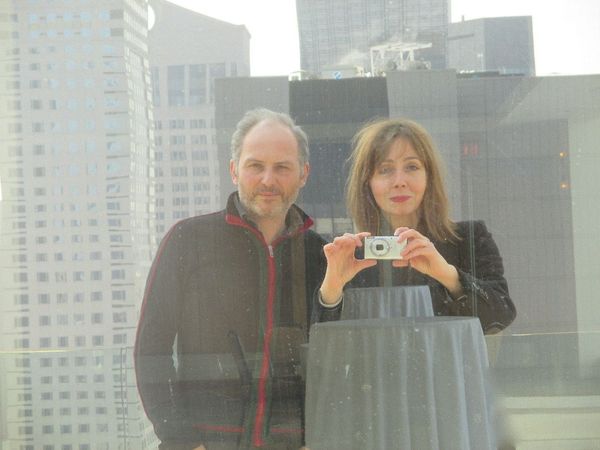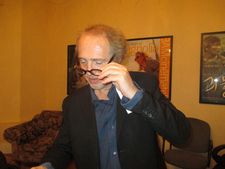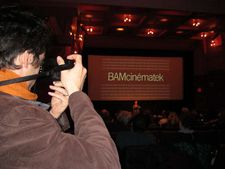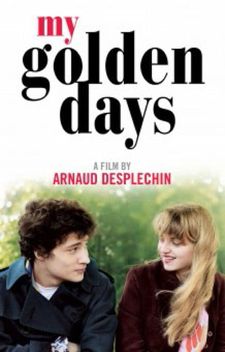 |
| Grégoire Hetzel with Anne-Katrin Titze: "It's like Bernard Herrmann or Ravel." Photo: Anne-Katrin Titze |
Grégoire Hetzel scored Mathieu Amalric's chronicle of fluid crime The Blue Room (La Chambre Bleue) and César winning director Arnaud Desplechin's mythical braid of adventure My Golden Days (Trois Souvenirs De Ma Jeunesse), A Christmas Tale (Un Conte De Noël); Kings & Queen (Rois Et Reine); La Forêt and The Beloved (L'Aimée).
Grégoire recently worked on Cédric Anger's Next Time I'll Aim For The Heart (La Prochaine Fois Je Viserai Le Coeur); Anne Fontaine's The Innocents (Agnus Dei); Renaud Fely's L'Ami (François D'Assise Et Ses Frères), Mathieu Demy's Americano and Catherine Corsini's Summertime (La Belle Saison), which he presented at Rendez-Vous with French Cinema in New York.
 |
| Arnaud Desplechin: "In Arnaud's films the music is always underscored …" Photo: Anne-Katrin Titze |
Gilles Deleuze, Bernard Herrmann and Maurice Ravel eventually reverberated from the composer extraordinaire after we searched for a location, feeling like a pair of roaming Goldilocks, inside his midtown hotel, just down from Central Park, to begin our conversation, landing with Grégoire at his desk, me on a round lounge chair which prompted the following exchange.
Anne-Katrin Titze: So you are going to analyze me asking the questions?
Grégoire Hetzel: I am Freud, you are like the patient in this chair.
AKT: You said that you think My Golden Days is very French?
GH: To me it is.
AKT: How did you work on that film with Arnaud? You've made five films together.
GH: Yes. it was very easy to work on this film because it's the fifth. It's always a question of intensity. The difficulty for composers is to be in the confidence of the director - reciprocal confidence. With Arnaud, I know him very well now. Kings & Queen was my first film with him. We only had 12 days - I had only two weeks to compose all the music for the film. It was straight to the essential.
_225.jpg) |
| Mathieu Amalric: "I love to compose with Mathieu because he is so exact." Photo: Anne-Katrin Titze |
The second one, strangely, was very very difficult. It was Christmas Tale. It was five weeks of work. In general, a film takes five weeks to be composed. More it's too much and less, it's too short.
AKT: I don't remember the music in the interrogation scenes between André Dussolier and Mathieu Amalric [in My Golden Days].
GH: It's thriller music, suspense music, very atonal.
AKT: I told Arnaud that these scenes reminded me of Lubitsch's Heaven Can Wait.
GH: In Arnaud's films the music is always underscored because the characters are always talking. So my music is under the words and around like a snake under the words and saying other things than the words are saying.
AKT: Wow, there's an image. The music as a snake under the words! Cédric Anger told me about working with you on Next Time I'll Aim For the Heart. He said that he told you he wanted the forest to sound like a church.
_225.jpg) |
| Agent (André Dussollier) interrogates Paul Dédalus (Mathieu Amalric): "I composed for Mathieu's face for Desplechin films." |
GH: Yes, I remember that. With organ.
AKT: And the arrest of the killer is like a funeral for a queen. What you see is not what you hear. Do most directors you work with follow that rule?
GH: Not always. But it's an ideal, I think, when the music is a counterpoint and not what you see. You know, when it's green on green, it's absurd. In the latest Desplechin film [My Golden Days], there is always nostalgia. The whole film is in the past. You can have voiceover and flashbacks or the music is saying when the present is not the present. For me in this film, it's the sound of memory. Not the whole film. In the beginning it's like a thriller.
AKT: The scenes with André Dussolier?
GH: Yes. And the scenes with the child and his father beating him and the mother's suicide, it's a bit like horror. It has horror music in it. It's exaggerated because it is from the child's perspective. And a child exaggerates all the things he sees.
AKT: In Mathieu Amalric's The Blue Room, there is a scene in the forest when the couple meet for the first kiss. I spoke with Mathieu about the music for that scene.
 |
| Mathieu Demy photographing Americano premiere at BAMcinématek Photo: Anne-Katrin Titze |
GH: You remember that? I love to compose with Mathieu because he is so exact. Like Arnaud Desplechin. They are so exact in their feeling, so precise in their intelligence and sensitivity that it's very easy for me to translate into music. We are of the same family - I don't know why. I've known Mathieu for a long time but we never meet. We are friends, we are close, but I composed for Mathieu's face [on the screen] for Desplechin films. It's very irrational.
AKT: What would he [Mathieu] say to you, for example for that [forest] scene? It has a Bernard Herrmann feel to it. Other filmmakers wouldn't even think of placing something like that there. It's the juxtaposition that works so well. How do you talk about the compositions?
GH: It's difficult to say. Sometimes there are references - it's like Bernard Herrmann or Ravel …
AKT: Non-musical references, too?
GH: For The Blue Room, for example - they are happy but something … The film is in the past and you have the present but the present is past. So when they kiss and make love during the first meeting, it's the beginning of love but the end of life. They are condemned. So the music was in-between. It was very very happy and romantic, a loving gesture, but already, there is regret and a feeling of the end, of a tragedy.
_225.jpg) |
| Next Time I'll Aim For the Heart director Cédric Anger: "I remember that. With organ." Photo: Anne-Katrin Titze |
You can translate that into music. Because music is the art of the soul. When you have a chord, a string trembling - it's directly a feeling of the sound. Music is the art of the affect. So it's very easy because it's more than a word. A chord can translate one and two and three things. You can say a lot with three chords.
AKT: What feeling is easy for you to translate to music?
GH: Romanesque! It's not a feeling. Novelistic music.
AKT: Is that because you are also a novelist? What is your novel about?
GH: It was about my childhood, my family, my parents. It was a bit autobiographical, but in the form of a novel. My adolescence. We have a word for it: roman d'initiation.
AKT: Bildungsroman. Novel of initiation. To what extent can music be autobiographical?
GH: Ah, when you compose music, you are a complete human being. We are like a well and we go into it to find something to translate with words or with notes. If its notes and not words, it's impossible to know. It's abstract. It's like an autobiographical abstraction of you. You know Deleuze?
 |
| My Golden Days US poster |
AKT: Yes, I do.
GH: He said, philosophy is concept art, painting is percept art and music is affect art. So music is a pure art of affect. You know, when I started to compose - I've composed for a long time now, more than ten years - I stopped to live. So my autobiography is finished. I'm joking a little bit. But life is very short now. Of course, I meet some people and live some love stories. Of course, I go to the cinema and I read some books. My life is more in the books and the music and less in life. It's normal. Life is for adolescents and children. But we have to be careful with that.
AKT: To not get lost? To go back and forth?
GH: Between art and life.
Coming up - Grégoire Hetzel on working with Catherine Corsini and Summertime.
Golden Days: The Films of Arnaud Desplechin, organised by Florence Almozini, runs through March 17 at the Film Society of Lincoln Center.
My Golden Days opens in the US on March 18 and screened in the 2015 London Film Festival.





















